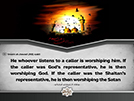Man
- Details
- Hits: 1729
Man
The scholastic philosophy gave the place of man to a God conceived by the medieval Church, which was inspired by the ancient Greek views in respect of their gods and mixed this conception with some religious myths. The Greek gods had a hostile relation with man and were considered to be apprehensive of man's gaining access to the Holy Fire and acquiring knowledge and power. They regarded man as their rival on the earth, who should be checked by any means possible.
The lords of the species, which were believed to be controlling the forces of nature were afraid lest man should overcome these forces and should subdue nature.
The story of Adam's Paradise was depicted as an attempt by God to keep man ignorant. The Forbidden Tree of which man was not supposed to eat, was represented as the tree of knowledge which man should not approach so that he might not rise in rivalry with God.
Furthermore, Adam's disobedience was believed to be an eternal sin and a total depravity of human nature. At last for the salvation of man and his deliverance from his original sin, God Himself had to appear in the body of Jesus Christ through the Holy Ghost. Thus spirituality became the speciality of the successors of Jesus and the churchmen.
From this point of view man is a despicable sinner. Only the ecclesiastical ministers deserve divine blessing. The key of the hidden treasures being in their hand, one must approach them for one's salvation.
Knowledge became confined to the Christian doctrines and all intellectual faculties were devoted to the discussion and interpretation of the religious texts. Virtue lay in the attachment to the organization of the established church.
Man believed to be deprived of divine grace, became a captive in the hand of the custodians of the sanctuary of the son of God. As he had lost everything, man was compelled to surrender himself submissively. In this process what totally disappeared was his self‑respect. This was the position of man in the West prior to Renaissance.











